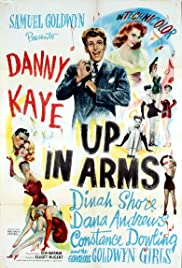
UP IN ARMS
US, 1944, 106 minutes, Colour.
Danny Kaye, Dinah Shore, Dana Andrews, Constance Dowling, Louis Calhern, Margaret Dumont, Virginia Mayo.
Directed by Elliot Nugent.
Danny Kaye's first film. Popular on the New York stage, on radio and in night clubs, he impressed people with his zany style and the speed of his routines. Samuel Goldwyn introduced him to the screen and presented the films of the first years of his career. This is a typical Army comedy enhanced by his presence and that of Dinah Shore who was so durable over so many decades in films, radio and especially television.
Dana Andrews in an unusual choice for the straight man to Danny Kaye's comedy. Virginia Mayo can be seen as the head of the Goldwyn Girls - she was to he his leading lady in his next four films. There are some very funny routines although they seem a bit basic now but the origins of Kaye's more mature routines can be seen. The song in the theatre foyer is a highlight. Many of his songs in this film are written by Sylvia Fine who was to be his wife and the writer of so much of his material throughout his career. Dated war comedy, but of great interest for the history of American comedy.
1. The film as an introduction to Danny Kaye, the way that he was presented in terms of comic routines, his speedy delivery, song and dance? Kaye's reputation prior to the film, throughout his film and television career? The particular characteristics of his style - the persona of the eccentric and weak young man who somehow or other achieves heroism?
2. The impact of this war comedy during the war? As the first Danny Kaye's comedies? The war impact now?
3. The contribution of the film to the war effort? The irony of the nervous wreck (the title of the original play) and his unwittingly becoming a hero? The potential for all Americans to heroism, the American dream?
4. The presentation of the American dream of heroism for the hypochondriac? The fulfilment of romance? Acceptance by friends and too The lush nature of the literal dreams - and the rather gaudy style?
5. The production values: colour, the hospital locations, the ship, the Pacific island, the fantasy especially for the musical sequences, the Goldwyn Girls?
6. Danny Weems as the hero of the film? The army men talking about his hypochondria and then our seeing it illustrated in the elevator? The infatuation with Mary and his blindness to Virginia? The humour of the outing and what it revealed about his character in terms of relationship to Joe, Mary, Virginia, Mrs Willoughby? His being drafted and the humour of his unwillingness to open the letter? The effect of the training on him - and the loss of so many pills, the men's reaction and their hardness towards him? The fights in camp? The making of the record? Life on the ship especially after Mary's unintentional stowing away? The effect of hiding, the chases around the ship and authorities' attitude towards him? His being in the brig and its leading to the heroism of such a great capture? Fantasy land and the dreams of the American male? Especially with the Goldwyn Girls an background to his heroism?
7. The contrast with Joe an the straight man, going out with Mary and Virginia, the background and chorus, Jowls benign attitudes especially trying to help him get out of the draft? Jowls helping him on the ship? The other soldiers and the contrast with Danny? especially the burly antagonistic men? Ashley an the authority figure being confronted by Danny? The irony of their appearance in his dreams? the dancing confreres, Ashley performing the wedding ceremony with Danny Kaye's speedy delivery?
8. Mary and Virginia an heroines, nurses, in the Army? Sweet, comic? How well delineated were their characters? Romance? Mary's niceness, Virginia's heroism in taking the blame? The background of the Goldwyn Girls as nurses and in the Army? how realistic?
9. Comment on the comedy routines and their style: the elevator sequence and making the man ill, the irony of rehearsing his proposal with Virginia, the milk sequence in the restaurant, the theatre foyer song, Joe and the opening of the letter, the lights in camp, their making of the record? and the later miming of it, the song and dance routines, the chase throughout the ship, hiding in Ashley's room, the inspection and his impersonating the Irishman (and the effectiveness of Danny Kaye's impersonations), the routine of tricking the Japanese and capturing them all?
10. The importance of the songs - the romantic songs with Dinah Shore? Danny Kaye's comic variations and the comic songs and especially the patter and routines between the two of them at the end? The patriotic song with people boarding the ship and its later use?
11. How well did the film combine all the elements of the screwball comedy with American dream fantasy and forties' style musical and comedy?
12. The light touch on male/female relationships, romance, love? The humour on hypochondriacs and heroes?